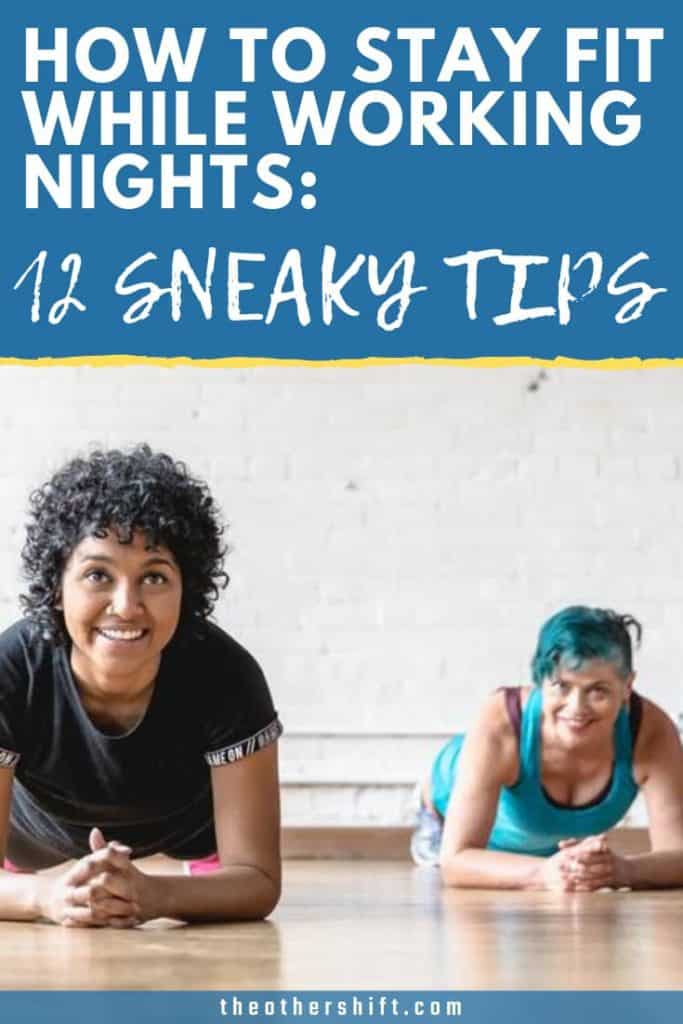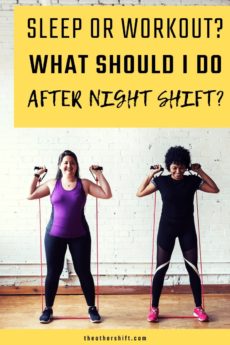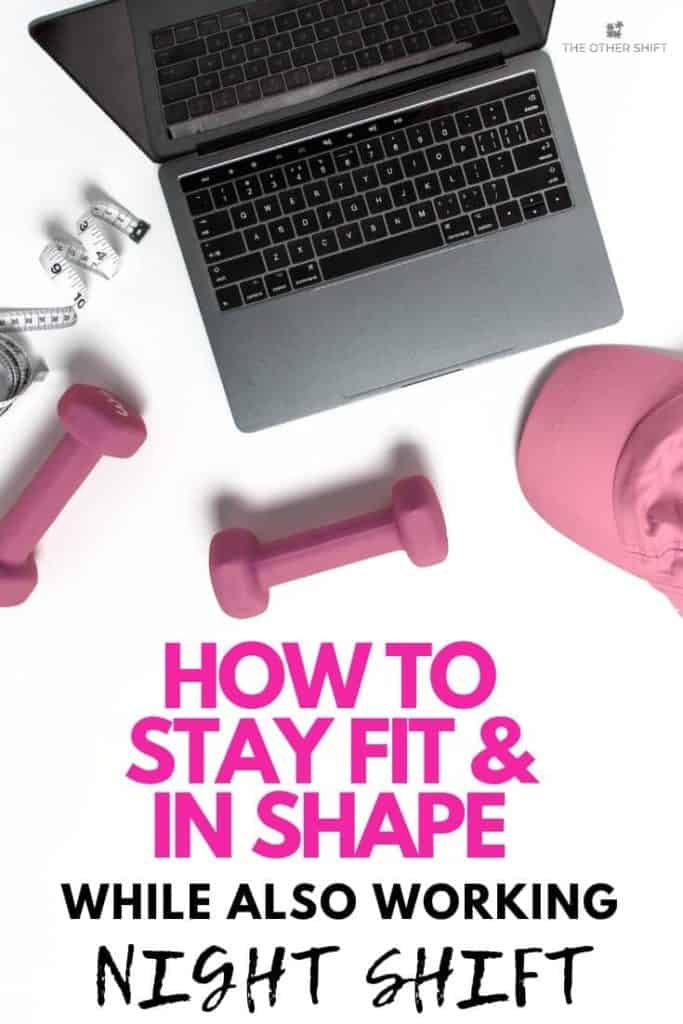Disclosure: This page may contain affiliate links, meaning we receive a commission if you decide to make a purchase through our links, but this is at no additional cost to you. Please read our disclosure and privacy statement for more info.
Nobody wants to be that easily fatigued and puffed night shift worker who struggles to make it down the stairs in the company fire drill. Staying fit while working 3rd shift is about using your imagination and making the most of even the smallest moments, like using the stairs instead of the elevator, to get your heart rate up.
Rather than focusing on diet AND fitness tips, this article is purely targeting staying fit with exercise and working out. If you’d like tips about what to eat and when as a night shift worker, be sure to check out this link.
Fitting in exercise while working night shift needs to be a conscious decision as it won’t just happen. But this choice doesn’t have to be hard. This post will show you sneaky ways stay to tighten those wiggly bits and get your heart rate up while working night shift.
1. Scrub, Vacuum and Mop Before Night Shift
On the day before your first night shift, make it your mission to get the house sparkling clean – without calling in help.
- Dust in places which rarely get touched such as behind the TV, bookshelves and between the DVD player, modem and the streaming TV service box.
- Wash the car with a bucket and rag instead of driving to the automatic car wash facility. Then vacuum the car with your vacuum at home (if possible) instead of using the services at the car wash. Having to pick up the vacuum and haul it around your car in tight spaces is a workout in itself! – Plus you save a few dollars in the process.
- Scrub the bathtub and shower to an inch of their life
- Clean out the filter in the dishwasher and scrub the oven
- Manually water the plants with a watering can instead of the hose
- Mop the floors with precise detail
- Mow the lawn with the hand push mower instead of the ride on (if it won’t take you 8 hours)
- Sweep out the garage instead of using the air blower
These tasks not only save you money but they help increase your heart rate, making the afternoon nap before a shift much easier! Plus, your house is spotless, taking away the stress of having a dirty home.
Related post:
- Preparing for night shift: How to Best Prepare for Night Shift and Stay Healthy

2. Modify How You Commute to a Night Shift
If you live within 3 miles of your workplace consider:
- Leaving the car at home and riding your bike to work
- Walk or ride all or part of the way 2-3 times per week (consider public transport for half the commute)
- Park further away from the office or simply in the same car park but the longest distance from the front door
- Use public transport instead of driving. The extra walk to and from the station will help boost blood flow and could prevent injury. You typically avoid traffic jams and save money on gas.
Before you make any huge changes in your commute we need to be smart. Here are some issues to consider when modifying your commute:
- Is the sidewalk clear and well lit?
- Are the roads and sidewalks safe?
- Is there cell phone reception available (travel nurses and truck drivers in particular need to think about this in remote areas).
- Do you need to walk through a park on your way home? If so, is it well lit and safe?
- Is there other staff leaving the shift at the same time who you could walk with?
- Is there a public transport stop close to your workplace?
- Are their secure bike cages you can use?
- If not coming from the work car park, is the main door to your workplace, which is normally open during the day, accessible at night?
- Is their security staff available if you run into any trouble?
Adopt the 1-mile rule
Think of all the places within a 1-mile radius of where you live. With the time it takes you to drive there through the traffic and find a park, you could have already walked there. Take a sturdy bag, backpack or even a trolley (pictured below via Amazon.com), over hurting your back if you buy too much.
dbet Foldable Trolley Dolly
(Click to see via Amazon.com)

3. Exercise Safely in the Car
We spend a lot of time in the car simply driving to and from work. The average American is spending nearly an hour commuting to and from their jobs…
But guess how much time we spend in the gym? Not much. Only about 23 percent of all U.S. adults get the recommended amount of exercise per week. (source)
So instead of just throwing in the towel and giving up, why not use the time we spend in the car wisely? Here is some exercise we can do in the car to stay fit on the way to and home from a shift.
Just a word of warning, remember you are driving a car so safety is more important than getting bigger arms and six-pack.
Driver:
- Shoulder exercise. Pull your shoulder blades back. Think of pinching your shoulder blades together, then release. Having a strong back is great for your posture, stopping you from slouching.
- Neck exercise. Sitting up straighter in your seat, shoulders back. Then push and pull your chin in and out 30 times.
- Butt exercise. Tighten your butt while sitting tall in your seat, holding this position for fifteen seconds, working up to one minute. Perform 2-4 sets.
- Stopped at the traffic light? Tense your muscles. Tighten your stomach muscles for 3 to 10 seconds. Repeat 4 times. The other drivers on the road won’t even know you’re working out. These exercises may help lower your blood pressure as well.
Passenger:
- Place a tennis ball in between your knees and give it a powerful squeeze with your inner thighs, holding a few seconds then relaxing. Do 2 lots of 15, working up to 4 sets over time.
- With the same tennis ball, place it between the palms of your hands, interlace fingers over the top of the ball. Raise elbows out to the side in line with your chest. Then push your palms together, holding for a few seconds, then release. You’ll feel this is your chest and shoulders.
[VIDEO] – This is a good video pointing out some great exercises for you as the passenger could do. These tiny workouts are great to think about when carpooling to work or when on public transport. You never know, you could get the all the commuters on the subway involved!
4. Move While Waiting In Line
The instant reaction for most while waiting for anything, aka the coffee line, is the pull out our phones and scroll social media, right?
Why not go against the grain and squeeze in some exercise while waiting for your turn?
- Calf raises while waiting for the bus. Lift yourself onto your toes and hold the position for 10 seconds. You can also use the curb or stairs for a bigger challenge if waiting on the street or in the subway.
- Stand instead of sit on public transport – even if there are seats
- While on the subway, try and stand without fully holding on. Brace your stomach muscles and bend your knees so you don’t fall. Just be close enough to the handrail so you can hold on if need be.
- Pelvic floor exercises while sitting and driving
- Stand on one leg. If waiting in a line for your healthy smoothie at the local cafe for example, stand on one leg. This simple maneuver will improve your balance and muscles through your quads and butt.
- Squeeze Your Abs. Draw your belly button to your spine. Contract/release, contract/release. Some call these vertical sit-ups.
- Roll your ankles. This helps loosens these joints and the tissue around the ankle, allowing them greater movement and less chance of injury.
Tips from a Firefighter
Doing yoga or some form of mental training, with a mind and body connection, is super important to keep your heart rate down. Staying relaxed while the adrenalin is pumping is critical and why these forms of exercise are recommended for firefighters and those in high-intensity jobs like emergency medical staff, surgeons and pilots.
5. Take the Stairs Instead of the Elevator
This one may seem a little more obvious, but resist using the elevator particularly when walking only 1-2 flights of stairs.
If you suffer from knee pain, I recommend taking the stairs up but take the elevator down as the pain is normally worse on the way down.
Here are three ways to incorporate stair climbing into your night shift routine (if there are stairs in your workplace) without thinking about it:
- Firstly, take it nice and slow in the beginning if walking up the stairs is a new healthy habit. Do this by starting to walk up a couple of flights then jump into the lift for the remainder of the journey. Add a flight of stairs every week until you’re making it up to your work level with ease.
- If you are feeling fatigued during your shift, take a friend or go by yourself and walk a few flights of stairs. This works brilliantly for myself and nursing colleagues when we need an energy boost that doesn’t involve caffeine.
- During the night shift, if you need to deliver a message or a physical item to someone, take the stairs instead of the lift. There is nobody watching at night so it’s cool if you need to take a few breaks.
How many calories can I burn walking up stairs?
A person weighing 160 lbs. will burn 102 calories walking up and down stairs for 10 minutes. By running, the calories burned will increase to 191. If you’re bored during night shift or have 10 minutes left on your break, this could be a great way to burn calories and get an energy hit.(source)
Related posts:
- Bored on night shift (with exercises): Bored on Night Shift? How to Stay Busy Without the Internet
6. Workout While Waiting for the Kettle to Boil
It’s the small moments which count, right? Make these few minutes impactful by completing all or even a few of following:
- 30 second wall sit
- 10 push ups
- 20 sit-ups
- 10 standing lunges
- 10 squats
- 1 minute of jumping on the spot (high knees, butt kicks, rope jump)
- Finish with 1 minute of cat-cow or downward facing dog (yoga poses)
Doing these seamlessly insignificant exercises can improve strength, endurance and make you feel stronger. Don’t waste time by just watching your plate go round and round in the microwave and create healthy habits.
Love to sprint but don’t have much time to train?
Just three 20-second sprints, with a 2-minute break in between, may be as good for you as 50 minutes of moderate jogging. You could do that on your lunch break and still have time for lunch. Just make sure to warm up first.
7. Sign Up To Health and Fitness App
Using a fitness app while working night shift is EXACTLY what I need for inspiration and motivation to change into activewear from my PJ’s and just get it done.
Most fitness apps invite you to be part of their community which is generally full of positive people with similar goals in mind. Watching and reading about others reaching their health and fitness goals using the same program as you can be very uplifting and just what you need after working a run of nights.
There are HEAPS of apps out there, so it’s about finding the one that’s right for you and brings you motivation to work up a sweat!
8. Exercise After a Night Shift
This may seem crazy, but working out after a night shift suits some people perfectly. There are fewer people around hogging your favorite machine and less people to compete with for a shower or a car park.
The key to remember here though is your sleep must not be compromised. If you are still able to obtain 7-9 hours of sleep after a workout, this method could be perfect for you. (Particularly if you struggle to find any time in the afternoon for a workout).
Here is a post we wrote titled “Sleep or Workout? What Should I Do After Night Shift?” to give you more information in obtaining the best workout possible.
9. Jump Rope
Yes, your favorite childhood toy is making a comeback!
Jump rope may seem too simple but my goodness it’s an effective, quick workout!
I jump rope 4-5 times per week, between 10-40 minutes at a time, depending on where I am. And if I’m totally honest, I am feeling it a minute in.
If you’ve only got 5-10 minutes and want maximum bang for your buck, say hello to the jump rope (and a good bra for the ladies!).
Here are a few reasons to consider jumping rope.
- Calorie shredder to help you lose weight. On average, if you jump rope for 15-30 minutes at a time you can burn up to 300-600 calories!
- Mobile and easy to transport to and from a shift (and even on vacation)
- Inexpensive
- Whole body workout
- Improves bone strength
- Boosts your heart and lung health
Here is a jump rope circuit I often use with an interval timer on your cell phone or stopwatch.
- Warm up: Star jump/Jumping jack for 30 seconds
- 1 minute two leg jump
- 10-second break
- 30-second right leg only
- 30-second left leg only
- 10-second break
- 30 second two legs
- x10 push ups
- 10-second break
- 30-second leg together side to side (like your jumping over a line on the ground
- 30-second alternating
- 10-second break
- 30 second alternating as fast as you can go
- 10-second break
- x20 sits ups
The first 3-5 minutes are the hardest. But once you break past this period you’ll be very impressed at your progress.
If you want to lose weight, the fitness gurus in the jump rope world recommend skipping for 30 minutes every day consistently (along with eating a low-calorie diet of course).
However, when I started skipping consistently about 6 months ago, I was only doing 5 minutes at a time because it was unfit! But now I am able to do 40 minutes without dying and being able to walk afterward – which I am impressed at myself.
If you want advice on the type of rope we recommend, check out our shift work tools recommendation page here. We have a few to choose from ranging in price to suit all budgets.
Related posts:
Advantages of jumping rope: 8 Impressive Jump Rope Benefits to Get That Killer Body
VIDEO – Great beginner 10-minute workout with helpful tips and technique advice.
10. Ride and Watch Instead of Sitting and Watching
While at home relaxing in front of the TV, why not ride an exercise bike instead of just sitting there with your feet up?
While I get we need a break from time to time, riding for the recommended 30 minutes a day is not even one episode of Game of Thrones!
From experience, you don’t even know you’re doing it after a while, particularly when watching something suspenseful or intriguing.
Dan has his exercise bike located in the corner of our lounge where he plays an hour of PlayStation, NBA specifically, every morning/afternoon, depending on his shift.
He often rides about 30-40 miles before starting his day which I think is amazing! Here is why he loves riding at home:
- He can literally roll out of bed and onto the bike
- He can wear what he wants
- It doesn’t cost a thing (after you’ve bought the bike of course)
- Don’t have to fight another bloke for a shower
- And it saves SO much time!
The XTERRA Fitness Folding Exercise Bike from Amazon.com is very similar to the bike Dan uses at home. But the only difference being, ours is not foldable – a feature I wish we had.
from Amazon.com is very similar to the bike Dan uses at home. But the only difference being, ours is not foldable – a feature I wish we had.
The seat is super comfortable, the handles don’t move around and there is a simple monitor to track your process. For a reasonable price, this bike is what I’d recommend trying out.
is what I’d recommend trying out.
But what if I’m not keen on bike riding?
Here are three other ways you can get fit while on night shift AND watching TV
- Why not use the ad break for a mini circuit in the lounge room such as pushups, sit-ups and squats? You can use the similar exercise I gave in tip #4.
- You’ve got cans in the pantry, right? Doing bicep curls with the baked beans in the pantry while watching TV is also a great time to fit in exercise.
- If you don’t feel like exercising, you can also use this time to tidy around the house, iron and fold your clothes if the pile is building up uncontrollably.
Related posts:
- Shift work best practices: 9 Shift Work Best Practices You’re Probably Not Doing

11. Use Distraction
If you asked me to run on the treadmill or even around the local streets after a night shift without music or listening to something, my performance would be pathetic. But with distraction, it’s a different story.
Though I’m not a great runner, the fact I am concentrating less on my heavy breathing and tired legs and more on what I’m listening to makes a HUGE difference.
When you do find the time to exercise we recommended listening to the following:
- Listen to your favorite band or workout playlist (we use Spotify and love it)
- An interesting TED talk
- An intriguing, interesting, funny or enlightening podcast on a topic of interest
- Stream YouTube getting lost in a topic you want to know more about – even if you just listen and don’t watch the video
- Listen to the audio of a class your taking
- Calling a friend who is BIG talker who doesn’t mind if you don’t say anything due to being out of breath
Need more distraction? Buy a dog
Owning a dog as a night shift worker is slightly controversial due to the extended time it typically spends alone at home. But we are firm believers it’s possible to do this well. They keep you fit with daily walks and are great companions to talk to after a long shift as they don’t talk back.
Related posts:
- Owning a dog and working shift work: Owning a Dog as a Shift Worker: Clever Tips to Make It Work

- Exercise excuses: 5 Tips to Solve Your Crazy Shift Work Exercise Excuses

12. Book In A Strategically Timed Fitness Class
On the day of your last night shift do you have a “short sleep” until around 1 pm so you can sleep that night?
If you’re anything like me, getting out of bed during this time is excruciating. But there are a few tricks I’ve learned to make the experience less painful.
These involve not only booking in a hairdressing or other beauty appointments but it also involves exercise.
Here are a few tricks
- Book in a class with your favorite instructor (and pre-pay to make you feel you have to go) – spin, circuit, yoga, pilates, cross-fit or a power weights class
- Organize with a friend to workout with you. This could be anything from a simple walk to using the local rock climbing facilities. The pressure to not let down a friend can be just the motivation you need.
- Sign up for “weeks free pass” at a local fitness center, pool, yoga center, etc for the period you are on night shift for added time pressure. (This has worked brilliantly for me as a full membership for these places is often pricey.)
- Play a “pick up” game of local sport which has been pre-organized
- Enter yourself in a local fitness competition which gives the winner an impressive reward you want. Anything from swimming, running or walking. If the admission fee is for a charity and you’re passionate about the cause this can also be motivational.
Related posts:
- Switching from nights to days: How to Quickly Switch from Night Shift to Day Shift

- Rotating shift work tips: Essential Guide to Working a Rotating Shift Schedule

Do you work an office, desk job overnight?
If you need to tell a co-worker something, don’t email it and walk it over instead. This gets you out of your set and allows you to bond with your co-workers. Do that a few times a night and you’ll be surprised how many steps you can get in.
Bonus: Other Night Shift Strategies to Staying Healthy
- Prioritize sleep by aiming for 7-9 hours every day and always nap before your first night shift. Blocking out the light by using blue light blocking glasses, blackout blinds and eye masks after a shift is a good idea as this light negatively impacts on your sleep hormones.
- Set time to meal prep to make sure you’re always prepared with healthy meals and snacks for night shift
- Take control of your roster and cluster your night shifts together if that schedule works for you and your family. Be proactive when your schedule is not working for you and talk to your manager
- Stay hydrated. Drink caffeine if you need an energy hit until midnight, then switch to fruit infused water or herbal tea.
- Find routine where possible despite it looking backward from “normal”
See our super slick and effective blue light blocking glasses here


Related Posts for Staying Fit While Working Night Shift:
- Meal Ideas: 6 Healthy, Freezable Shift Work Meal Ideas For Beginners

- Energy Drinks: What Should I Drink On Night Shift? 10 Energy Boosting Beverages

- No Sleep: 8 Useful Hacks For Surviving Night Shift With No Sleep

- Can’t sleep: Can’t Sleep After Night Shift? 13 Weird Tips That Actually Work

- Eating on night shift: When Should I Eat On Night Shift?

- Shift work medications: Insomnia and Shift Work Sleep Disorder Medication Review

Summary: How To Stay Fit While Working Night Shift: 12 Sneaky Tips
Staying fit while working night shift often gets thrown in the “too hard basket” – and mine was overflowing at one point!
But it doesn’t have to be a chore.
Use the mundane time we all have in our day to make exercise happen. Using an app, modifying your commute, putting down your phone and using even the smallest moments can make a huge difference to your fitness level.
How do you stay fit while working night shift?
Cheers,

Disclosure: This page may contain affiliate links, meaning we receive a commission if you decide to make a purchase through our links, but this is at no additional cost to you. Please read our disclosure and privacy statement for more info.
Recent Posts
An examination of the night shift professions, that while sometimes underappreciated, are necessary for civilization, in its current form, to exist. A city can be thought of as a machine. Each...
Culminated from an exhaustive yet well-funded journey into the night, this article will prepare you for life outside of work while being a denizen of the dark. During days off, night shift...





